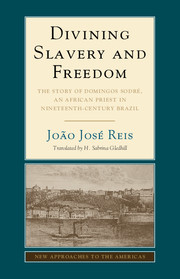 Divining Slavery and Freedom
Divining Slavery and Freedom Published online by Cambridge University Press: 05 May 2015
DOMINGOS' AFRICAN BACKGROUND
We know very little about Domingos' African background. Once he was in Bahia, he was identifi ed as a Nagô, one of the many African “nations” or ethnic terms that, in this case, designated the Yoruba-speaking people. In 1882, Domingos stated in his last will and testament that he was born in the Yoruba kingdom of Onim, and I estimate his birth to be in the late eighteenth century. He also declared that he was the “legitimate child” of African parents, Porfírio Araújo de Argolo and “Bárbara de tal,” or “surname unknown.”
I can think of two possible narratives for this African family's enslavement. One is that Domingos and his parents were sold and shipped to Bahia together, because he mentioned Christian names for both of them as well as his father's Brazilian surname, neither of which sufficed to find them in the local archives. Their names also indicate that both parents managed to achieve manumission, because slaves rarely carried surnames. They also suggest that each member of the family belonged o a different master, at least at the time when they were freed. The son's surname was Sodré, the father's was Araújo de Argolo, an aristocratic family name in Bahia, and the mother's was unknown: by the time he dictated his will in his old age, Domingos could no longer remember it.
Another, less likely, possibility is that Domingos' parents were freed-persons who had returned to Africa from Bahia, and that is why he referred to them by their Christian names, which returnees usually retained. Most of the former slaves known to have embarked on that return journey did so at a later time, particularly after the Revolt of the Malês in 1835, when many were deported from Brazil and others decided to leave Brazil after relentless government harassment.
To save this book to your Kindle, first ensure no-reply@cambridge.org is added to your Approved Personal Document E-mail List under your Personal Document Settings on the Manage Your Content and Devices page of your Amazon account. Then enter the ‘name’ part of your Kindle email address below. Find out more about saving to your Kindle.
Note you can select to save to either the @free.kindle.com or @kindle.com variations. ‘@free.kindle.com’ emails are free but can only be saved to your device when it is connected to wi-fi. ‘@kindle.com’ emails can be delivered even when you are not connected to wi-fi, but note that service fees apply.
Find out more about the Kindle Personal Document Service.
To save content items to your account, please confirm that you agree to abide by our usage policies. If this is the first time you use this feature, you will be asked to authorise Cambridge Core to connect with your account. Find out more about saving content to Dropbox.
To save content items to your account, please confirm that you agree to abide by our usage policies. If this is the first time you use this feature, you will be asked to authorise Cambridge Core to connect with your account. Find out more about saving content to Google Drive.